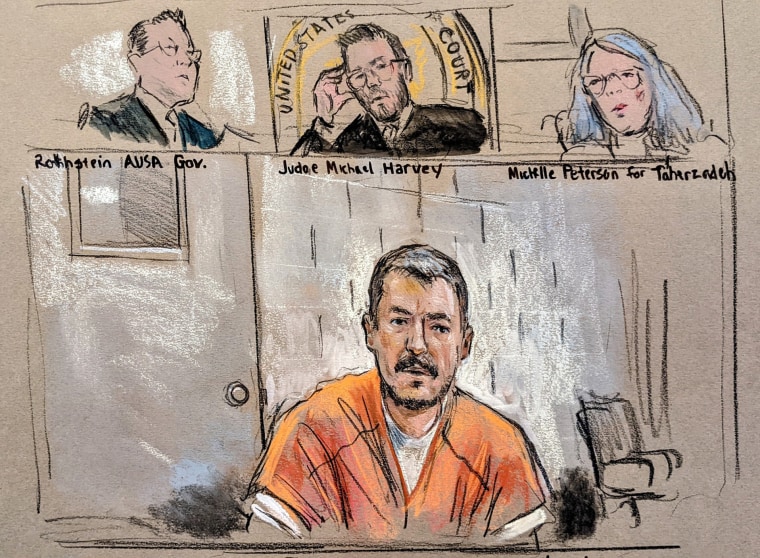Lawyer for men charged with impersonating agents says feds are latching on to ‘conspiracy theories’
Two Washington, D.C., men accused of posing as federal agents to ingratiate themselves to Secret Service agents assigned to the White House are merely law-enforcement buffs who pose no danger to anyone, their attorneys said during a bail hearing Monday.
The government has “jumped to the wildest conspiracy theories imaginable” with its allegations against Arian Taherzadeh and Haider Ali, defense attorney Michelle Peterson told a federal judge.
Her comments came in response to a court filing last week in which prosecutors warned that allowing Taherzadeh, 40, and Ali, 35, to be freed on bail pending trial could pose a “risk to national security.”
Prosecutors said the men, who are charged with impersonating Department of Homeland Security agents, had firearms, ammunition, body armor, tactical gear and surveillance equipment in their apartments in a building that’s home to a number of agents from other agencies.

In a filing arguing he should be released to home confinement to his father’s house in Virginia, Taherzadeh’s attorneys suggested he was all talk, and that his claims of being a federal agent were “an embarrassing misrepresentation that got out of control.”
One defense attorney noted in the filing that Taherzadeh voluntarily spoke with investigators after his arrest, and as “he advised law enforcement in his lengthy interview, he had no intention of compromising any federal agent.”
“He acknowledged gifts to agents with whom he had a genuine friendship. He acted out of a desire for friendship, not to influence anyone. He never asked for anything from the officers he befriended, never gave them anything for the purpose of gaining something in response, and deeply regrets his involvement in this matter,” the filing said.
Prosecutors have said the FBI is investigating whether the pair was receiving money from overseas, though Taherzadeh’s lawyer contends there was “no large sum of money involved.” The lawyer also noted that while Taherzadeh rented five apartments in the building, he never paid rent and owes the landlord over $220,000. Taherzadeh also told another investigator his private detective company was going out of business, according to court filings.
Gregory Smith, an attorney for Haider, suggested in a separate court filing that his client might have legitimately believed he was doing work for the federal government as part of his work for Taherzadeh’s company, United States Special Police LLC.

Smith noted that Taherzadeh is accused of duping numerous federal agents into making them think he was one of them.
“The Government itself has gone to great lengths in describing how many experienced federal law enforcement agents — individuals it notes are formally trained to look for and recognize deceptions such as this — nevertheless fell for this ruse, with four U.S. Secret Service agents even placed on administrative leave as a result,” the filing says. “If all of those experienced federal agents, with their years or even decades of experience, did not see through Taherzadeh’s claims, why is it fair to expect more from Mr. Ali, a high school graduate with no college degree and none of their formalized training?”
Smith asked that his client, a married father of four young children, be allowed to stay in home confinement.
Lawyers for both men also pointed out that the charges against their clients carry a maximum prison sentence of three years and no minimum, meaning they might not see any jail time even if they’re convicted.
In court last week, prosecutor Joshua Rothstein said the crime is a “serious offense” and the pair pose “a serious danger.”
Investigators say the pair were “lavishing gifts” on Secret Service agents, including letting them stay in an apartment rent free.
Taherzadeh had several guns when he shouldn’t have had any because of previous domestic violence conviction, and investigators found illegal high-capacity magazines for their weapons when they searched their apartments, prosecutors said.
Taherzadeh’s lawyer argued that the guns shouldn’t be a reason for keeping him detained since they are no longer in his possession.
Prosecutors also highlighted Ali’s travels to Iran and Iraq in recent years, and said he allegedly told a witness in the case that he had ties to Pakistan’s intelligence agency.
Ali’s lawyer submitted letters to the judge from his family, saying that he visited Iran and Iraq for religious purposes and that he has no ties to Pakistani intelligence.
Magistrate Judge G. Michael Harvey asked prosecutors to address whether the pair can be held in home confinement on Tuesday, and said he’ll rule on the issue after that.
Reuters contributed.


